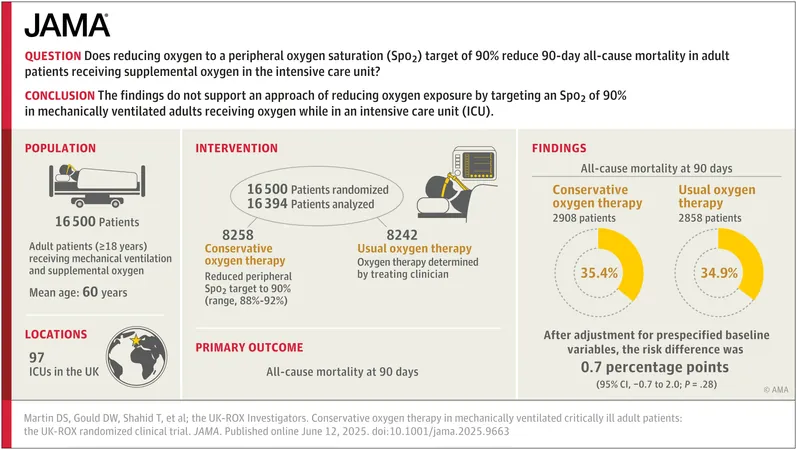
Revolutionary Study Reveals: Lowering Oxygen Levels for ICU Patients May Not Affect Survival
2025-06-12
Author: Arjun
A groundbreaking study has unveiled that dialing down the supplemental oxygen for intensive care patients does not harm their survival chances, reshaping how we approach treatment in critical care.
The Reality of ICU Admissions in the UK
Every year, about 184,000 patients find themselves in NHS intensive care units (ICUs), with over 30% requiring life-saving breathing assistance from mechanical ventilators. Yet, the optimal use of oxygen therapy has long been a contentious issue, with indications that administering too much or too little could lead to complications.
The UK-ROX Trial: A Massive Leap Forward
In light of the uncertainty surrounding oxygen therapy, researchers initiated the UK-ROX trial, the largest clinical trial of its kind in the UK. They enlisted 16,500 patients across nearly 100 ICU facilities, aiming to discover whether a strategy of conservative oxygen therapy—keeping oxygen saturation around 90%—would lower mortality rates.
Remarkable Findings
Published in the prestigious journal JAMA, the study concluded that there was no significant difference in survival rates. Approximately 35.4% of patients receiving conservative oxygen therapy died within 90 days, compared to 34.9% who received the standard treatment. This intriguing result suggests it's safe to lower oxygen levels in critically ill patients, though it may not necessarily boost their chances of survival.
The Call for More Personalized Care
Lead researcher Professor Daniel Martin from the University of Plymouth emphasizes the implications of the study. He states, "While reducing supplemental oxygen shows no significant overall benefits or harm, it highlights the need for a tailored approach to oxygen therapy. Our goal should be to ascertain the specific oxygen needs of each patient to enhance outcomes effectively."
A Landmark Contribution to Critical Care
The UK-ROX trial stands as a monumental advancement in ICU research. Paul Mouncey from the Intensive Care National Audit & Research Center remarks that this comprehensive study provides critical evidence for clinicians, allowing them to make informed decisions.
The Future of Oxygen Therapy in Critical Care
Co-investigator Professor Mike Grocott points out the merits of the study, reinforcing how essential it is to develop individualized oxygen therapies for critically ill patients. The research was not only acclaimed at the Critical Care Reviews Meeting 2025 but was also conducted cost-effectively, demonstrating that extensive clinical trials can be viable in today's financial climate.
As the medical community digests these findings, the focus will undoubtedly shift towards refining oxygen delivery methods and improving patient care holistically.

 Brasil (PT)
Brasil (PT)
 Canada (EN)
Canada (EN)
 Chile (ES)
Chile (ES)
 Česko (CS)
Česko (CS)
 대한민국 (KO)
대한민국 (KO)
 España (ES)
España (ES)
 France (FR)
France (FR)
 Hong Kong (EN)
Hong Kong (EN)
 Italia (IT)
Italia (IT)
 日本 (JA)
日本 (JA)
 Magyarország (HU)
Magyarország (HU)
 Norge (NO)
Norge (NO)
 Polska (PL)
Polska (PL)
 Schweiz (DE)
Schweiz (DE)
 Singapore (EN)
Singapore (EN)
 Sverige (SV)
Sverige (SV)
 Suomi (FI)
Suomi (FI)
 Türkiye (TR)
Türkiye (TR)
 الإمارات العربية المتحدة (AR)
الإمارات العربية المتحدة (AR)